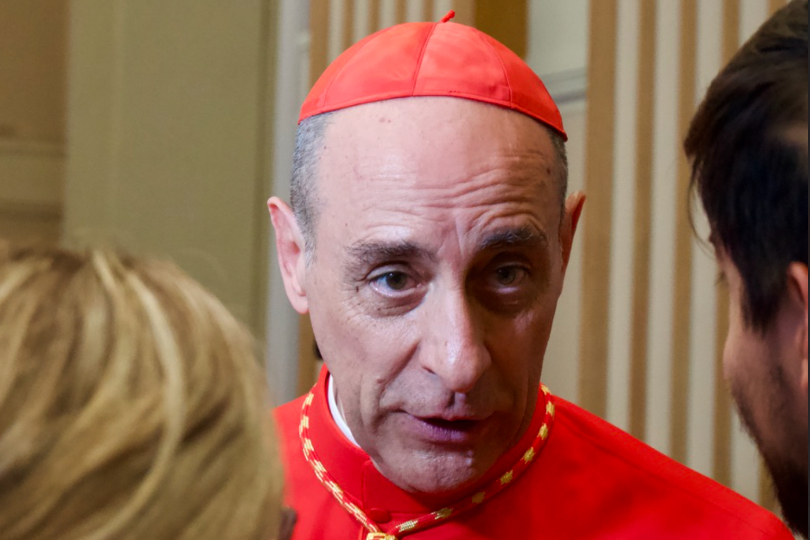Cardinal Victor Fernández has released a press statement intended to “clarify” his Fiducia Supplicans text which allowed blessings of same-sex couples, in an attempt to limit the widespread opposition from bishops to such blessings. Fernández also warned that there “is no room to distance ourselves doctrinally” from Fiducia Supplicans.
Issued January 4, Cardinal Fernández’s press release was an attempt “to help clarify the reception of Fiducia Supplicans, while recommending at the same time a full and calm reading of the Declaration so as to better understand its meaning and purpose.”
Fiducia Supplicans was released December 18, 2023, and allowed “blessings for couples in irregular situations and for couples of the same sex,” while adding that the Church’s teaching on marriage between one man and one woman remained unchanged.
Some, such as Fr. James Martin have taken the text to mean they are authorized to bless same-sex unions.
On the other hand, the document has caused a storm of opposition in the Church, with large numbers of bishops and bishops’ conferences around the world expressing outrage and opposition to the text. Such rejections of the document have been particularly strong across Africa.
Referencing these reactions, though without naming any in particular, Fernández wrote that “the understandable statements of some Episcopal Conferences regarding the document Fiducia Supplicans have the value of highlighting the need for a more extended period of pastoral reflection.”
He argued – seemingly against undeniable evidence – that the responses from bishops’ conferences “cannot be interpreted as doctrinal opposition, because the document is clear and definitive about marriage and sexuality.”
Quoting from his own introduction to Fiducia Supplicans, along with paragraphs 4, 5, and 11 – which presented Church teaching on marriage – Fernández argued that “evidently, there is no room to distance ourselves doctrinally from this declaration or to consider it heretical, contrary to the Tradition of the Church, or blasphemous.”
Bishops’ rejection of blessings
Opposition to Fiducia Supplicans has not been sparked by its pronouncements on the nature of marriage, however. Bishops have welcomed how the text outlines the true teaching on the sacrament. Rather, the opposition is to blessings being offered to same-sex couples.
The new prefect of the Congregation (now Dicastery) for the Doctrine of the Faith (CDF) admitted that “some bishops, however, express themselves in particular regarding a practical aspect: the possible blessings of couples in irregular situations.”
Fiducia Supplicans section 31 reads clearly that:
Within the horizon outlined here is the possibility of blessings of couples in irregular situations and of same-sex couples, the form of which should not find any ritual fixation on the part of ecclesial authorities, in order not to produce confusion with the blessing proper to the sacrament of marriage.
Fernández argued that this was calling for blessings of people who are together, but not of their unions per se: “the Declaration contains a proposal for short and simple pastoral blessings (neither liturgical nor ritualised) of couples in irregular situations (but not of their unions), underlining that these are blessings without a liturgical format which neither approve nor justify the situation in which these people find themselves.”
Writing that different dioceses will implement Fiducia Supplicans at different times “depending on local contexts and the discernment of each diocesan Bishop with his Diocese,” and that each bishop has authority of his own diocese, Fernández nevertheless prohibited bishops banning priests from acting in line with Fiducia Supplicans:
Prudence and attention to the ecclesial context and to the local culture could allow for different methods of application, but not a total or definitive denial of this path that is proposed to priests.
Veiled warning to Africa
The response form Africa’s various bishops’ conference has been notably strong, with numerous bishops warning priests against any blessings of same-sex couples.
Cameroon’s bishops issued a statement of nearly unmatched forthrightness in which the bishops declared “we formally forbid all blessing of ‘homosexual couples’ in the Church of Cameroon.” Contrary to many liberal societies in the West, homosexuality is not socially accepted behavior throughout much of Africa, a reality highlighted by a number of bishops on the continent in their respective responses.
Fernández, while noting the differing laws prohibiting homosexuality, warned against any opposition to Fiducia Supplicans even in principle. “It remains vital that these Episcopal Conferences do not support a doctrine different from that of the Declaration signed by the Pope, given that it is perennial doctrine, but rather that they recommend the need for study and discernment so as to act with pastoral prudence in such a context,” he wrote.
In countries where homosexuality is illegal, Fernández called on local bishops not to re-iterate the church’s own condemnation of homosexual actions, but to focus on the “great and wide-ranging pastoral responsibility that includes training, the defense of human dignity, the teaching of the Social Doctrine of the Church, and various strategies that do not admit of a rushed response.”
More on LifeSite News.
 The Libertarian Catholic
The Libertarian Catholic
















